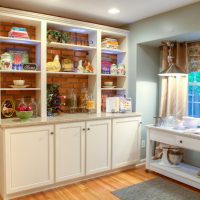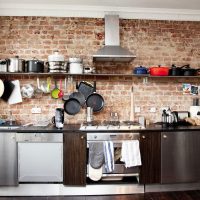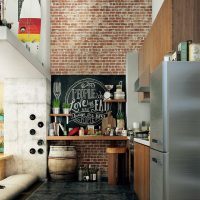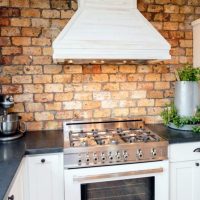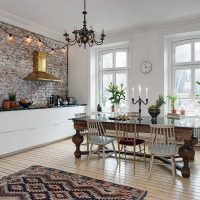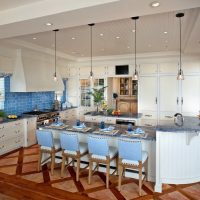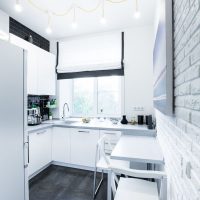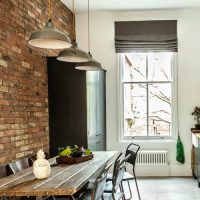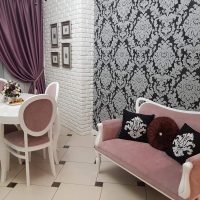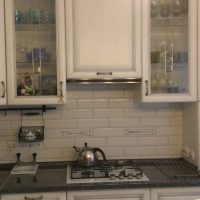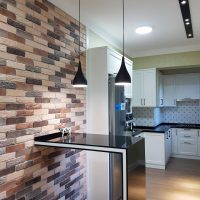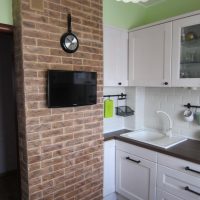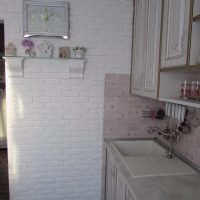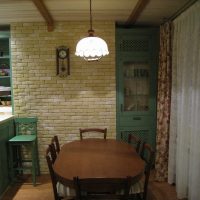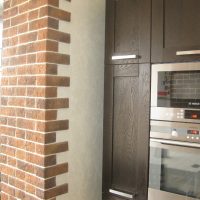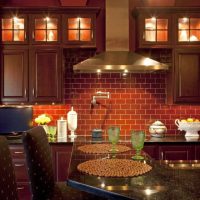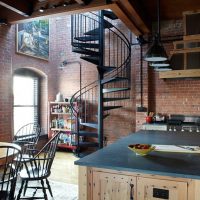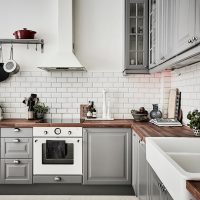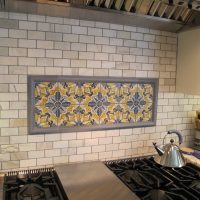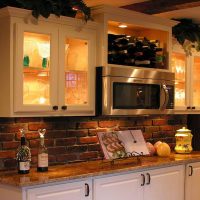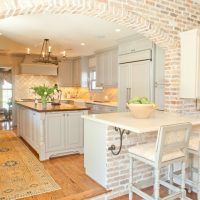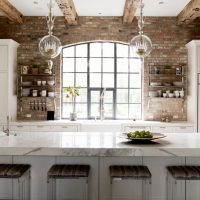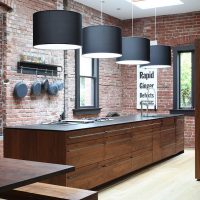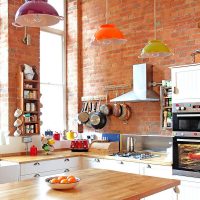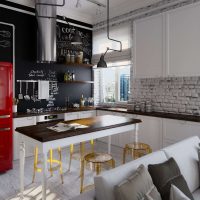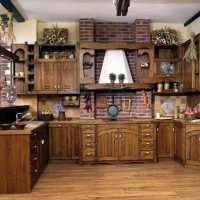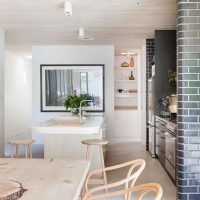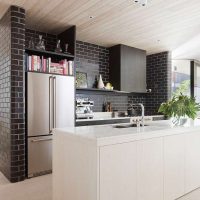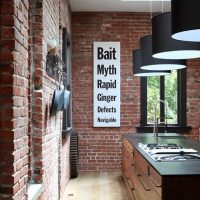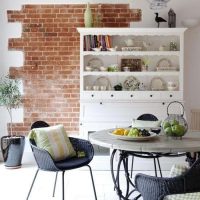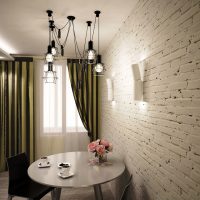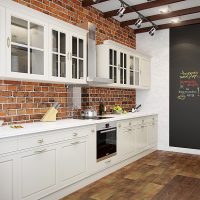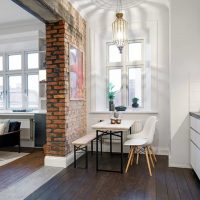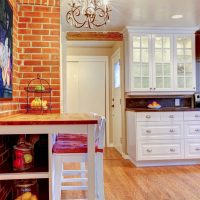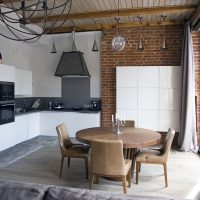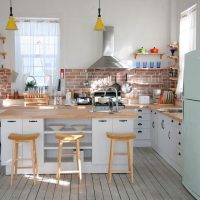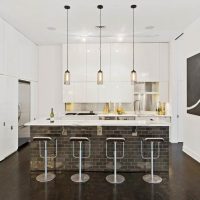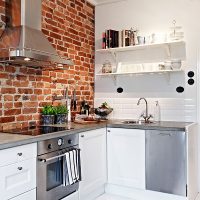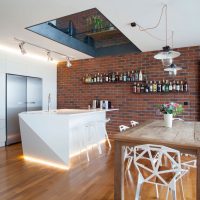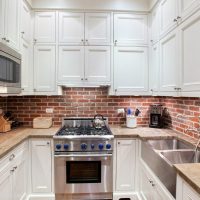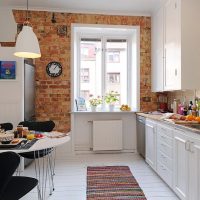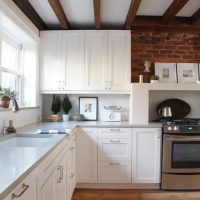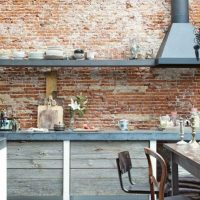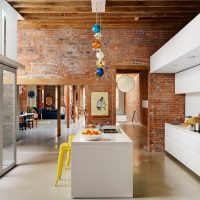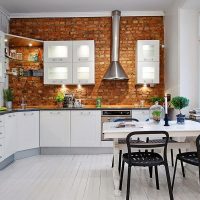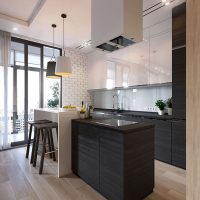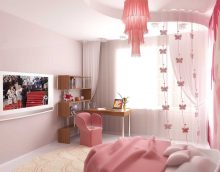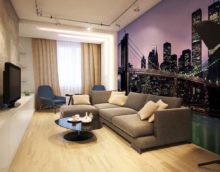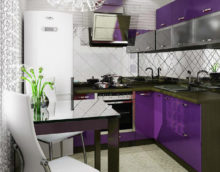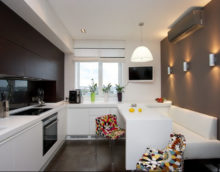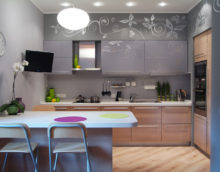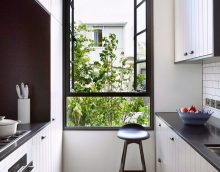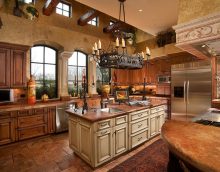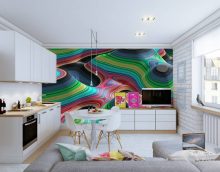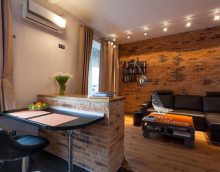How to use a brick in a kitchen interior
Finishing the kitchen is not only tiles, whitewashing and waterproof wallpaper. Brick in the interior of the kitchen fits perfectly into the modern design, regardless of the size of the space. But in order for such material to be in harmony with the general decoration, it is important to know how to use it correctly and where.
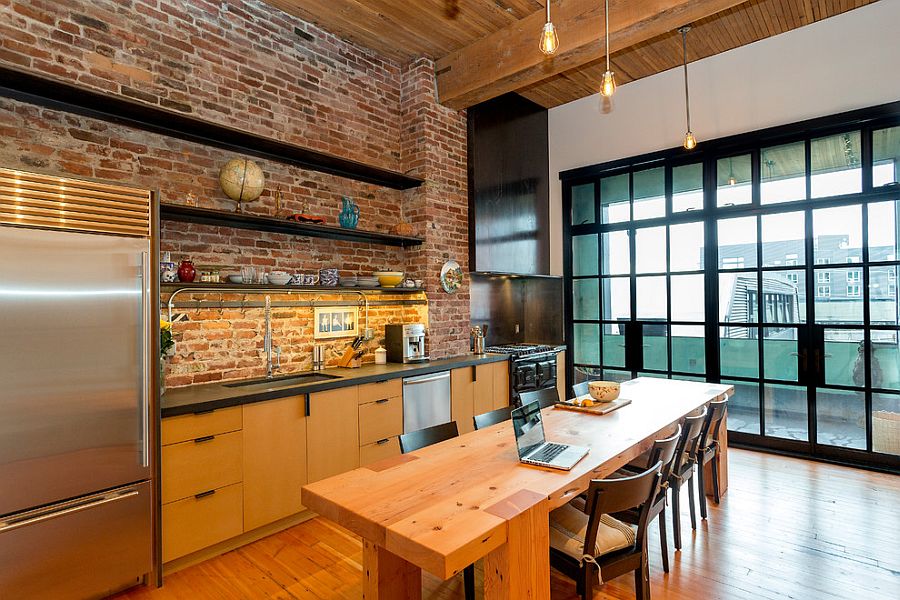
Brick wall - a great idea to update the interior of the kitchen
Content
Benefits
Brick is a strong and reliable material for both external and internal cladding. The advantages of this design include:
- long service life;
- resistance to temperature changes, which is especially important in a kitchen;
- heat resistance;
- water resistance;
- good insulating qualities;
- strength and resistance to shock;
- resistance to household chemicals;
- environmental friendliness;
- hypoallergenicity.
Brick walls are good not only in terms of practicality. This decor creates a warm and cozy atmosphere.
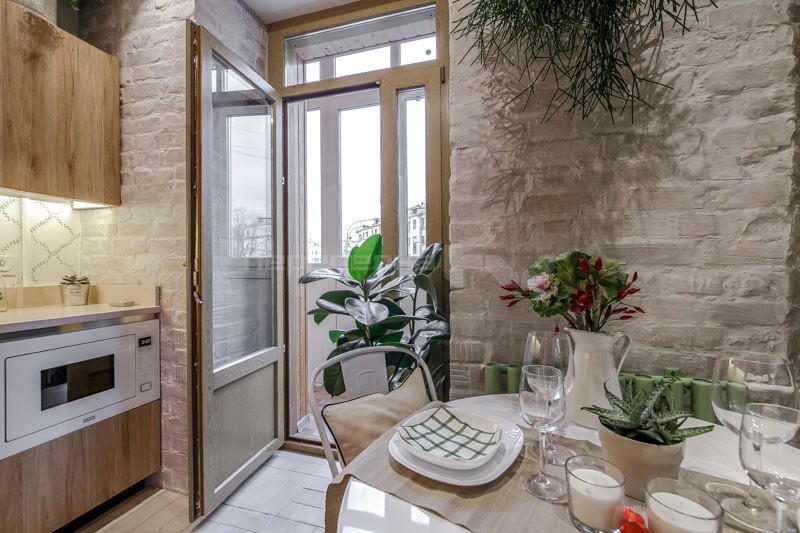
Brick finish makes any kitchen original and cozy
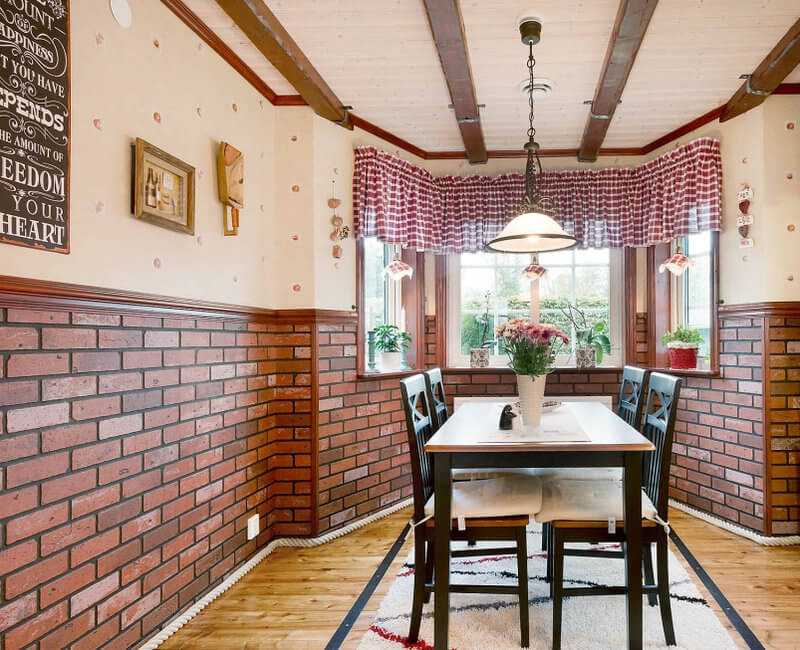
In order not to overload the space, combine brick with other materials
disadvantages
Despite the mass of advantages of a brick, it has disadvantages:
- heterogeneous texture, making such a surface difficult to wash;
- dirt gradually accumulates in the seams and mold can develop;
- oily spots are more difficult to remove from a porous surface.
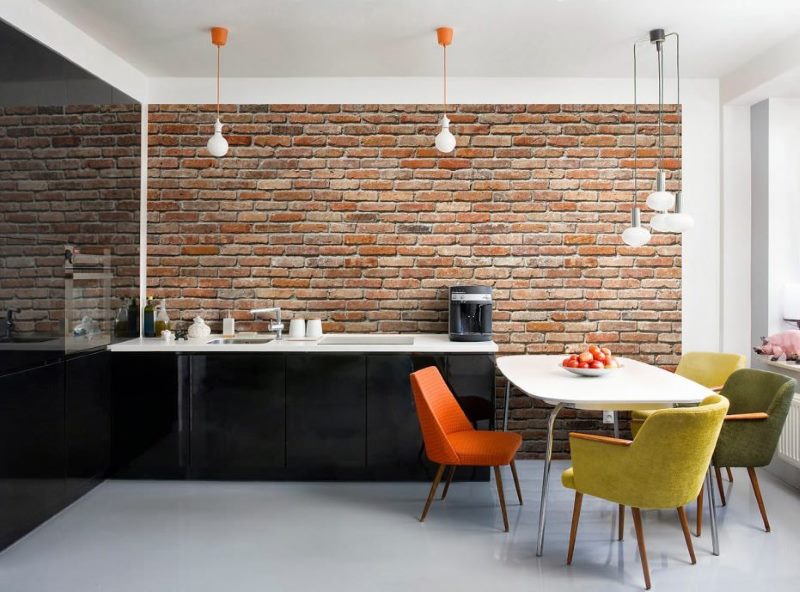
You will have to regularly wipe the masonry, otherwise the appearance of the wall will quickly deteriorate
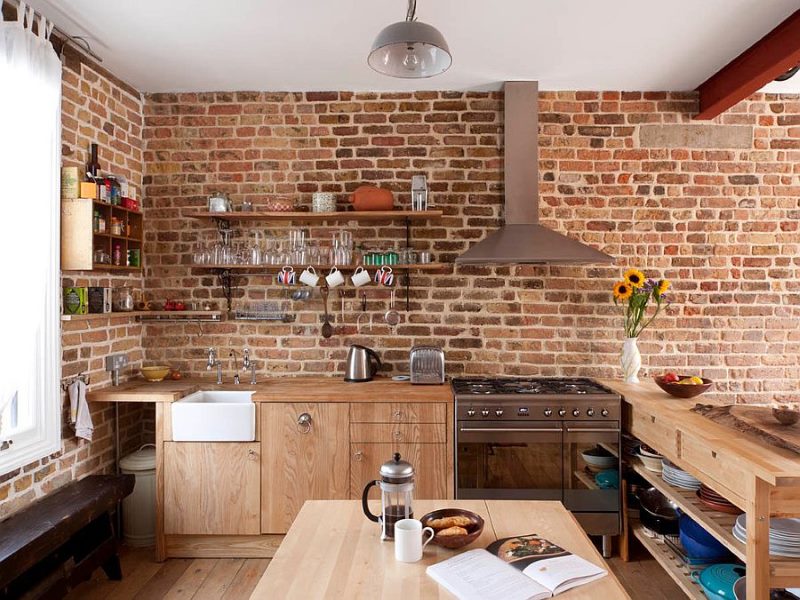
Red brick practically does not reflect light, which means that more fixtures are required for comfortable lighting of the kitchen
Brick walls require careful maintenance and regular cleaning. There are disadvantages not only in terms of the practical use of such a design:
- Natural brick tends to absorb light, making the room darker. To make it cozy in such a kitchen, you will have to add more light.
- If the brickwork is too large, this visually makes the kitchen smaller. Given the light absorption, such an interior will become even darker.
To avoid negative effects, the brick must be used in a metered amount and only for the design of one of the walls or individual sections.
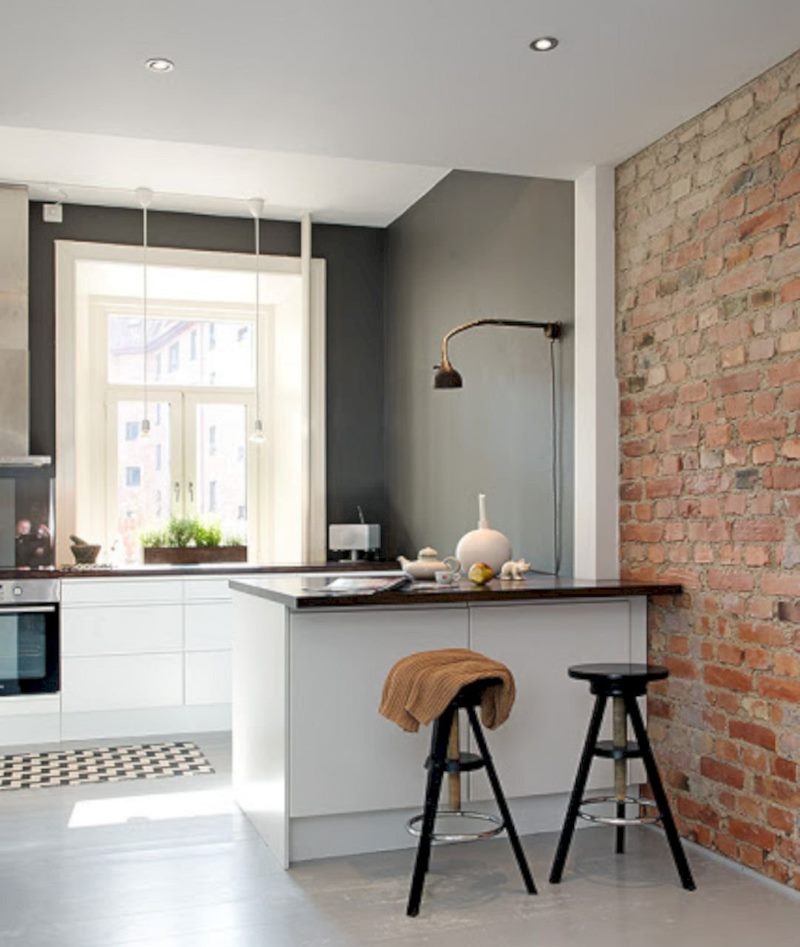
Brick needs to be used metered even if you are a fan of urban styles
Types of material
Brick is not only a dark red or white color and a rough surface. Different materials allow you to choose the right shades and texture up to gloss or mirror shine.
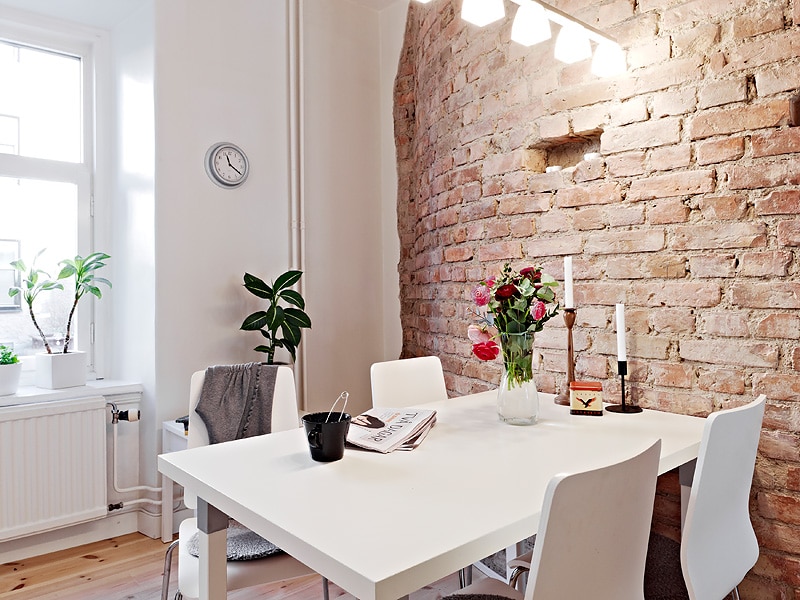
Chipped brick - a fashionable solution for interiors in industrial or rustic styles
Natural brick
If the owners of the apartment are lucky, and it is in the old house, natural brick is the easiest finishing option for the kitchen. It is enough to remove the old coating to get to the brick. To give the surface a presentable appearance, it is coated with varnish or paint. An additional layer will protect the brick from dirt and dust, this finish is easier to care for in the kitchen.
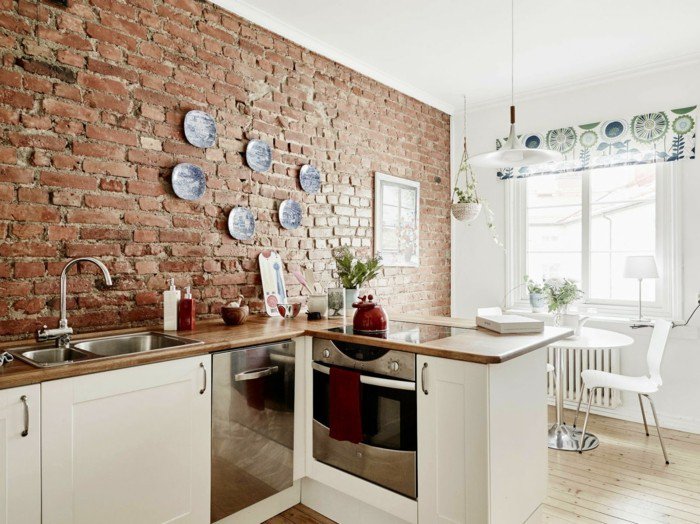
If you live in a house with brick walls, just remove the stucco to get a beautiful finish
A brick wall can be artificially aged with a craquelure, or covered with plaster, preserving the texture of the masonry. Another decor option is a transparent glass panel.It will protect the brick from any impact and at the same time visually expand the space by adding more light.
Facing
Due to the small size and thickness, such a brick can be used even in a very small kitchen. Fine masonry will not make the space even smaller already, and due to its size it is convenient to use on any surface. Cladding brick is well suited for window and doorways or kitchen aprons.
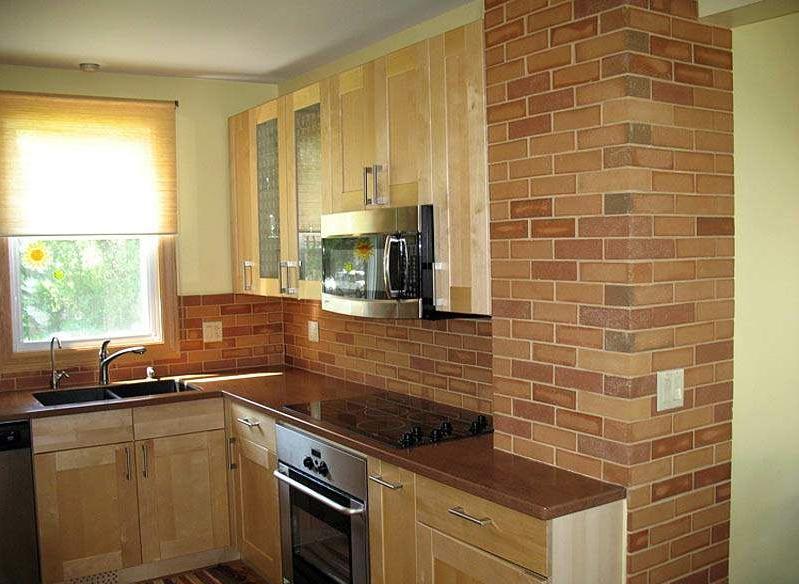
Cladding brick itself has a fairly smooth surface
Ceramics
Ceramic tiles with the effect of brickwork will suit any style of interior. A variety of textures, colors and sizes allows you to use this material in a variety of combinations. Natural stone design is suitable for Provence, country or Scandinavian style, and glossy surfaces are a godsend for minimalism or hi-tech.
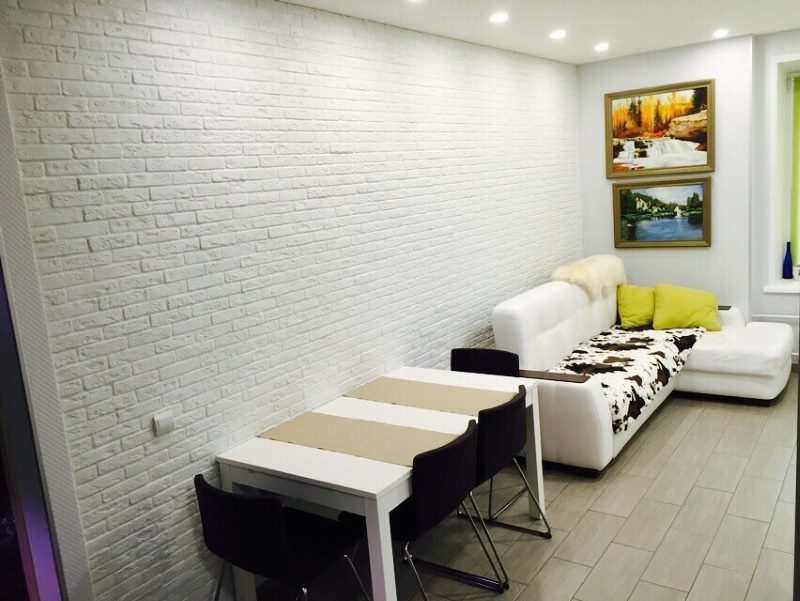
Ceramic tile imitating brick or stone is one of the most popular finishes.
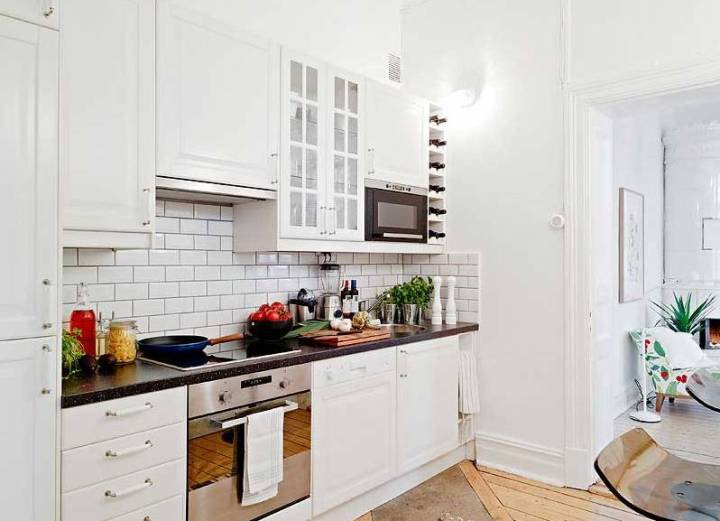
Glossy tiles will be easier to clean.
Other materials
Real brick is heavy and bulky, which makes it an unsuitable cladding option for thin walls. Glass panels with a brick pattern or dense vinyl wallpaper with a suitable texture will be a good replacement.
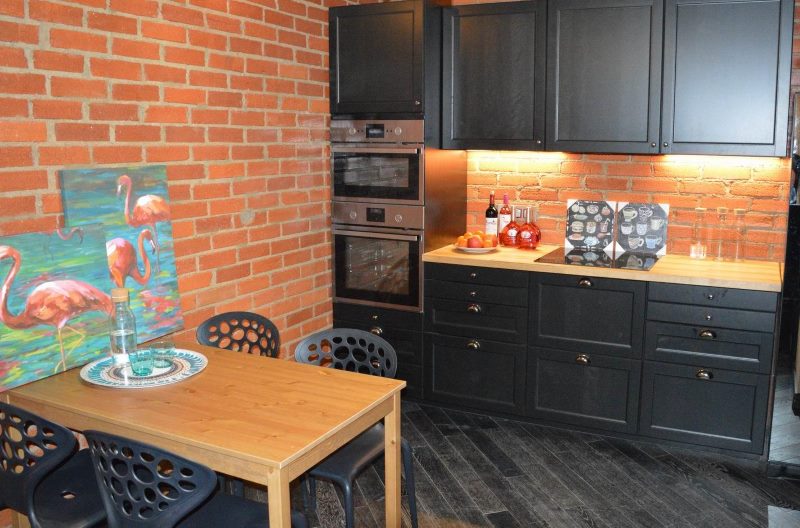
The fastest way to decorate the interior is to use “brick-like” panels, which are quite high quality and practically do not differ from natural materials
| comparison table | ||
| Finish | pros | Minuses |
| Natural brick | Strength, resistance to fire and temperature extremes, durability. | Rough surface, difficulty in maintenance, risk of mold development in the joints, meager selection of shades. |
| Facing | Lightness, compactness, many options for facing, rich palette. | The high cost of work, the appearance of white plaque over time. |
| Ceramics | Durability, wear resistance, ease of care, not afraid of water and fire. | Price, complexity of work. |
| Glass panel | Environmental friendliness, simplicity in installation and leaving, durability. | Price, relative fragility, dust and greasy spots are immediately visible. |
| Wallpaper | The choice of textures and shades, low cost, ease of care. | Some types of wallpaper can not be washed, fire hazard, fragility. |
How to apply in the interior
The brick wall in the interior of the kitchen most often causes associations with the loft. However, the use of bricks is more multifaceted, which allows it to be combined with the most unexpected options for interiors.
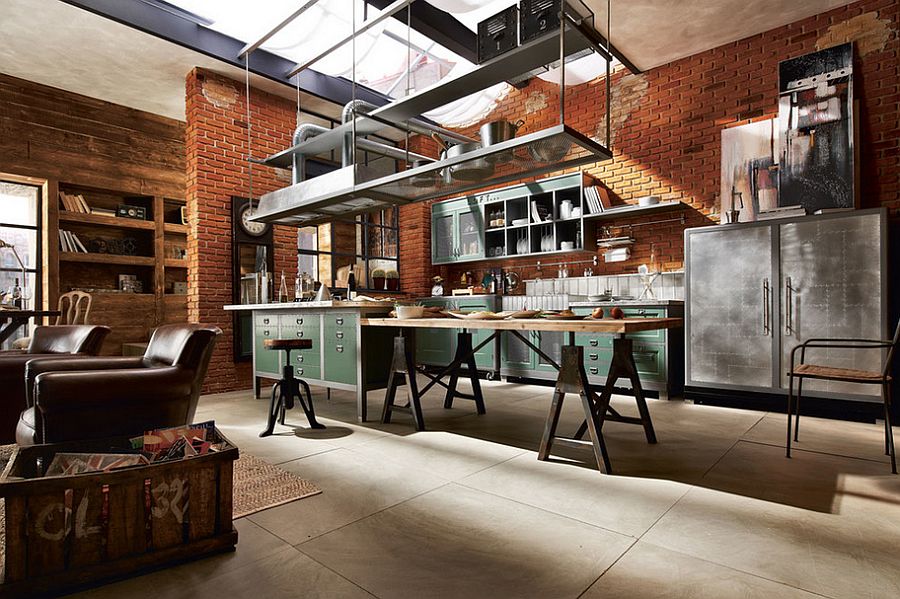
Natural brick is more suitable for a loft
Where brick cladding is appropriate:
- High tech. Glass and chrome surfaces are a characteristic feature of this style. Brick allows you to select them, shifting the emphasis to the necessary elements. Both classic red and white look equally stylish.
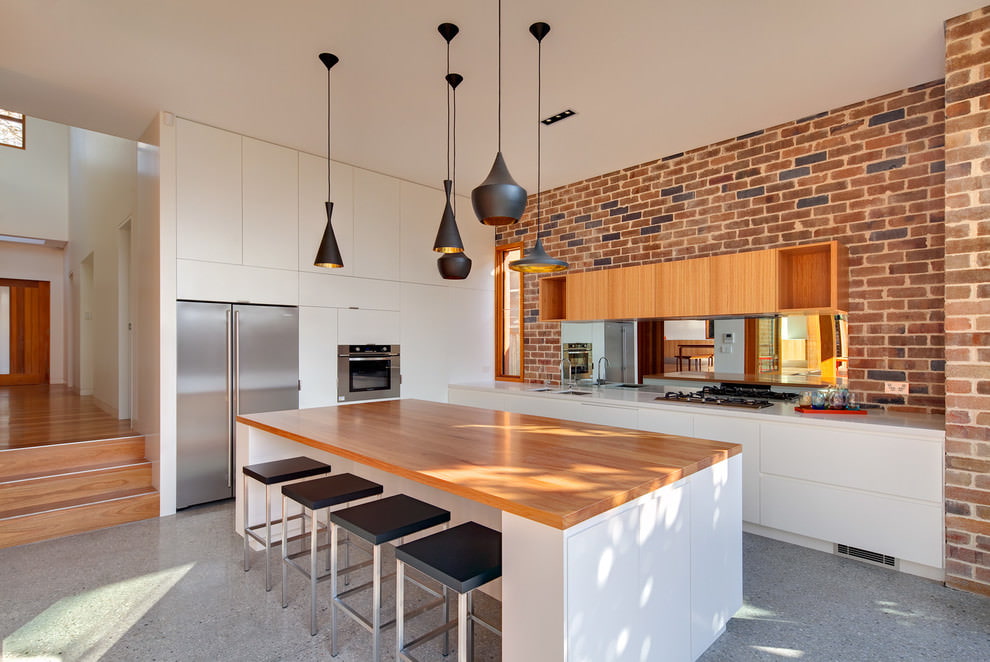
Spacious high-tech kitchen
- Gothic. Gothic style is strict and concise, brick walls fit perfectly into the interior. The classic combination is a light background and dark furniture.
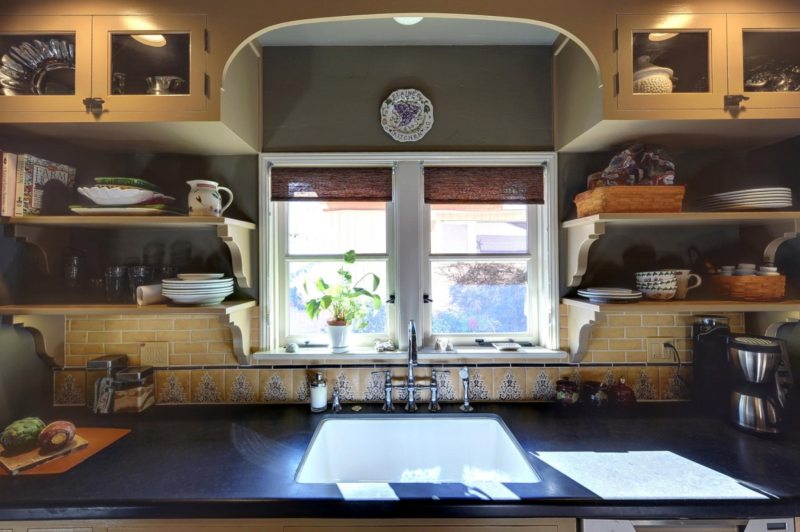
Gothic apron in the kitchen
- Art Deco. For this direction, it is better to choose restrained shades of coffee or dark chocolate. This color looks strict and luxurious, emphasizing the elegance of the interior.
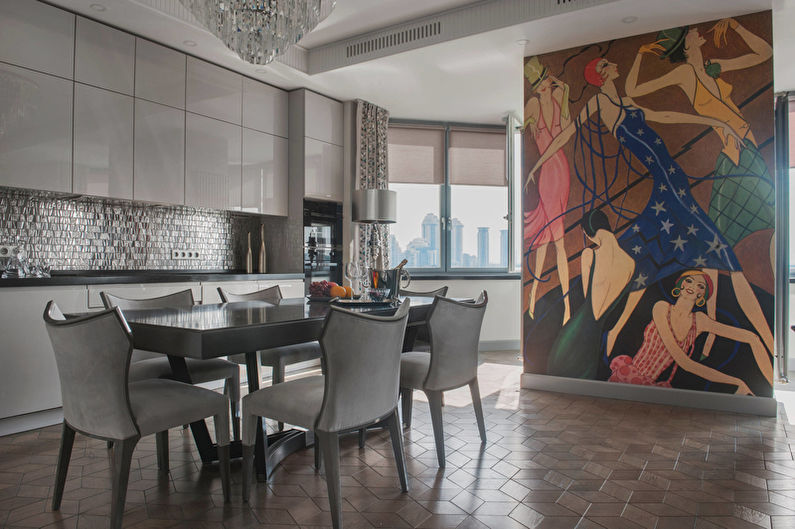
Stylish kitchen apron under a "torn" brick
- Minimalism. This direction is extremely strict and concise, and brickwork can add a little extravagance to the design. Black or steel gray are perfect as a color scheme.
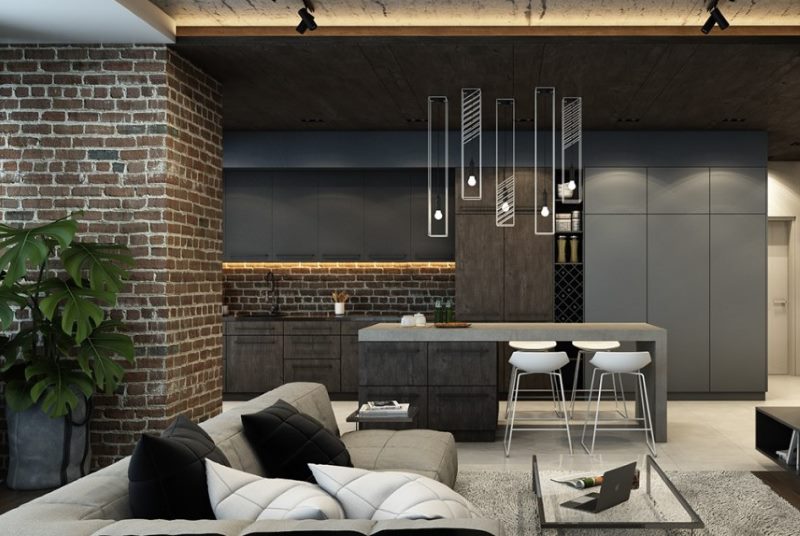
Brutal minimalist style kitchen
- Mediterranean style. Brick of white or succulent terracotta shades is suitable for facing arches or vaults. It goes well with wooden beams on the walls and ceilings.
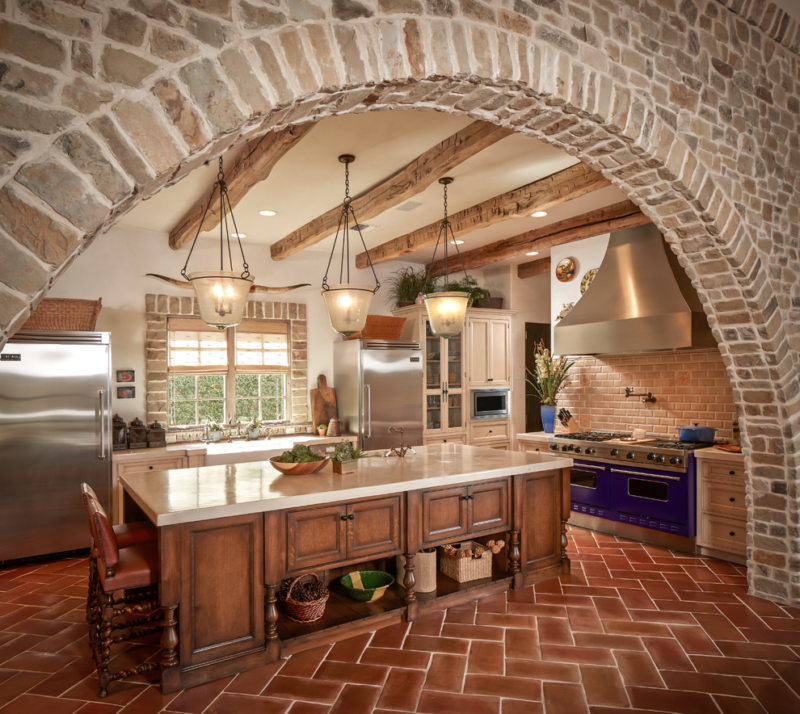
Brick arch in Mediterranean style kitchen
- Classic. Despite the conservatism of classic interiors, brick is appropriate here in the form of small inserts. Brickwork can distinguish an apron or a bar counter.
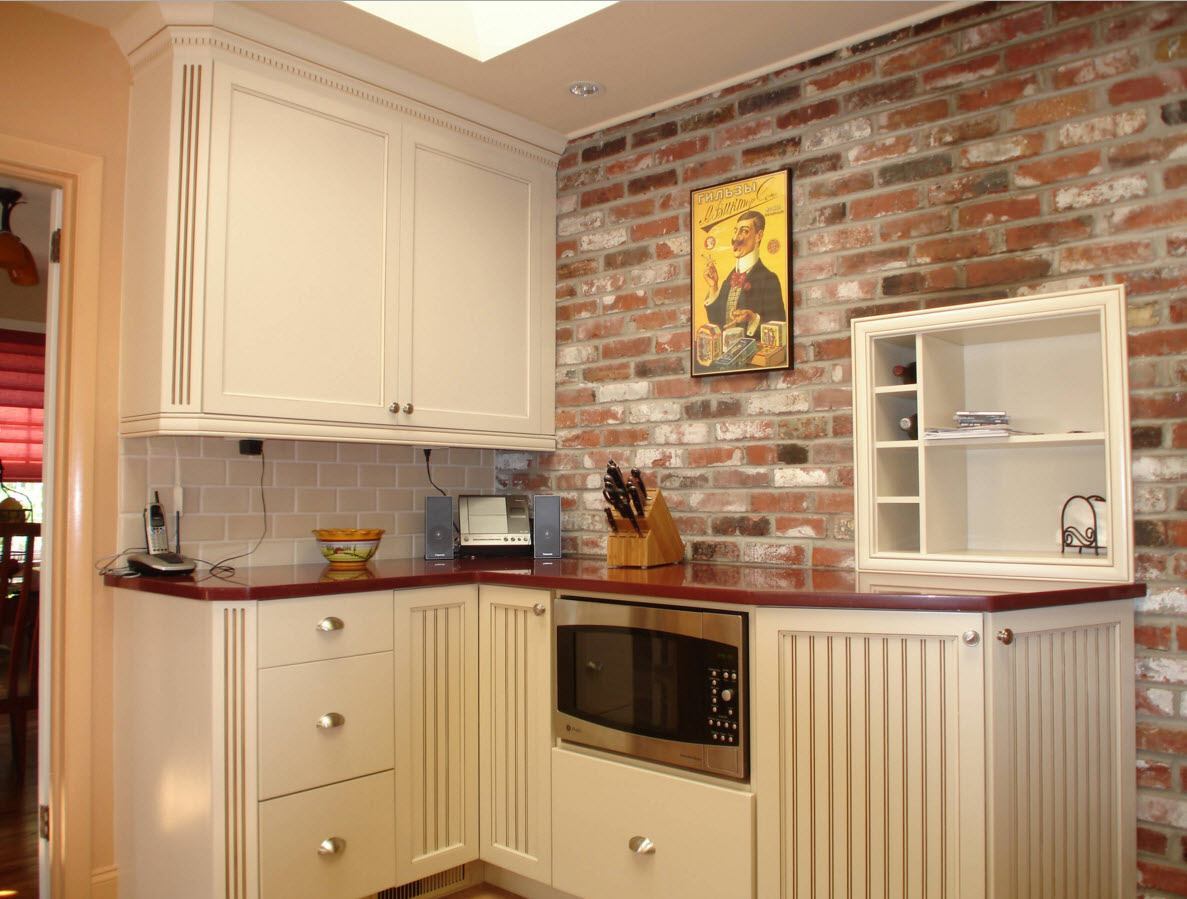
Classic headset combined with a brick wall
As you can see, brick walls easily fit into even the most rigorous interior styles. And so that such a cladding does not cause dissonance, you need to choose the right color and texture of other surfaces. It is worth considering the color scheme of furniture and textile elements.
Room Zoning
Brick walls can be a great way to zone space. In the combined rooms or in the studio, the kitchen area can be separately distinguished with the help of a brick. In this case, it is used to decorate an apron, highlight an accent wall or for a partition between the kitchen and the living room.
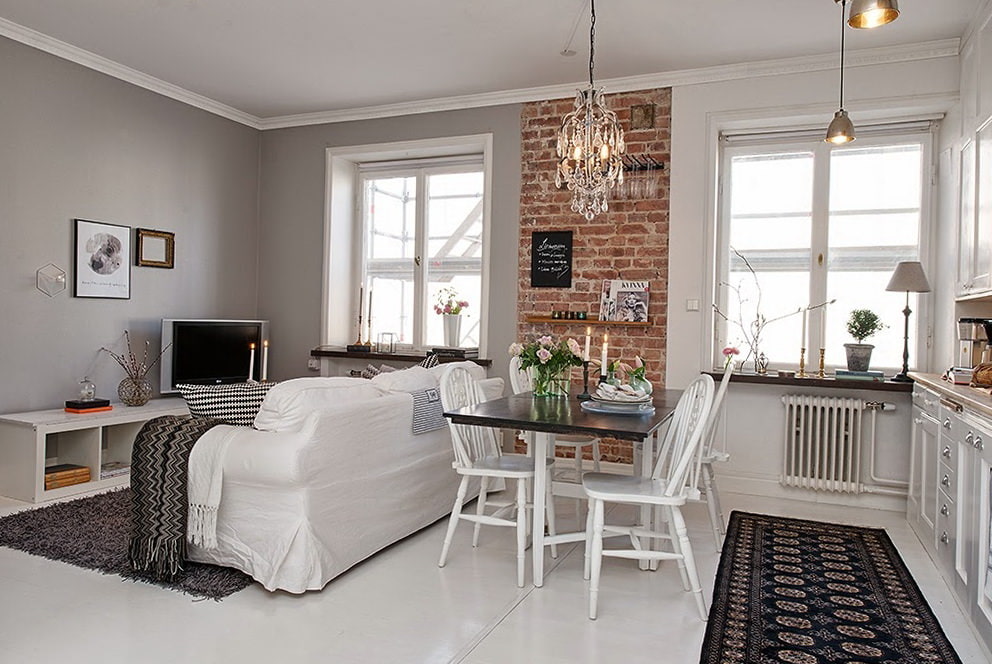
An example of a successful allocation of a dining area with brickwork
A solid or partial partition can become a separate decoration of the interior if you decorate it with paintings, panels, hang lamps or put fresh flowers in niches. The decor will dilute the roughness of the cladding, but at the same time preserve the touch of industrial style. If desired, you can paint the brickwork in tone with the rest of the finish or choose contrasting color combinations.
How to paint a brick surface
Painting a brick wall in the desired color is one of the most popular finishes. Moreover, in new homes, this process should be postponed for at least a year, otherwise the effect will be most unexpected. Painting itself does not take much time, finishing work is carried out in several stages:
- The surface is thoroughly cleaned with water and a stiff brush. Alkaline and acidic products must not be used.
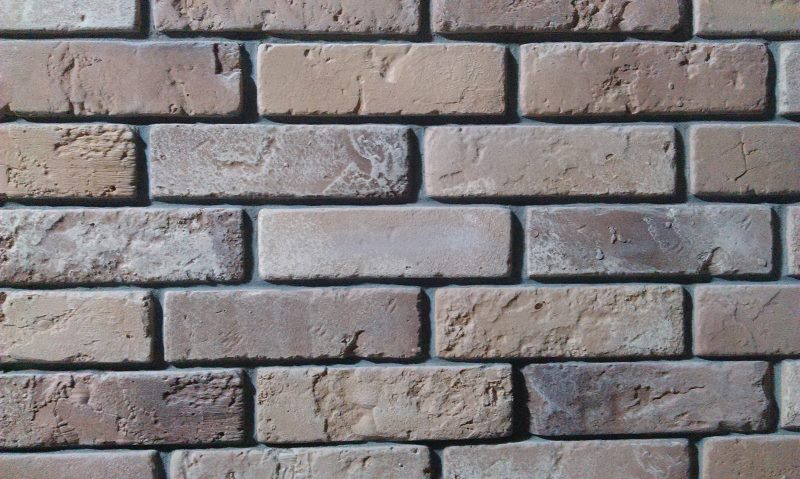
The wall must be cleaned of old coating and dust.
- The brick wall must dry completely, so it is best to paint it in the summer.
- Before painting, the surface is primed.
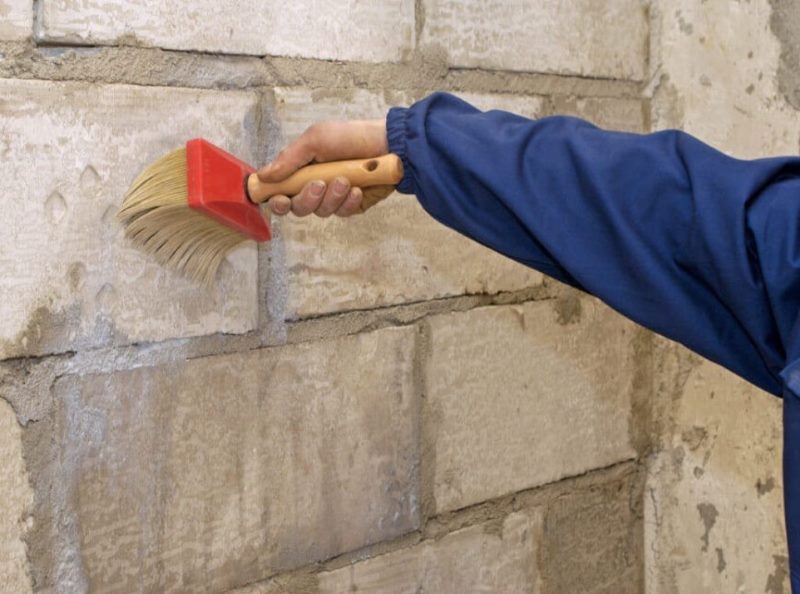
The primer will ensure high-quality painting and reduce the consumption of topcoat
- Layers of paint are applied.
The choice of matte or glossy finish depends only on the wishes of the owners of the apartment and interior features. If you want to surprise guests, you can choose shades with a metallic effect or mother of pearl. Paint will become an additional protection for a brick wall and simplify maintenance.
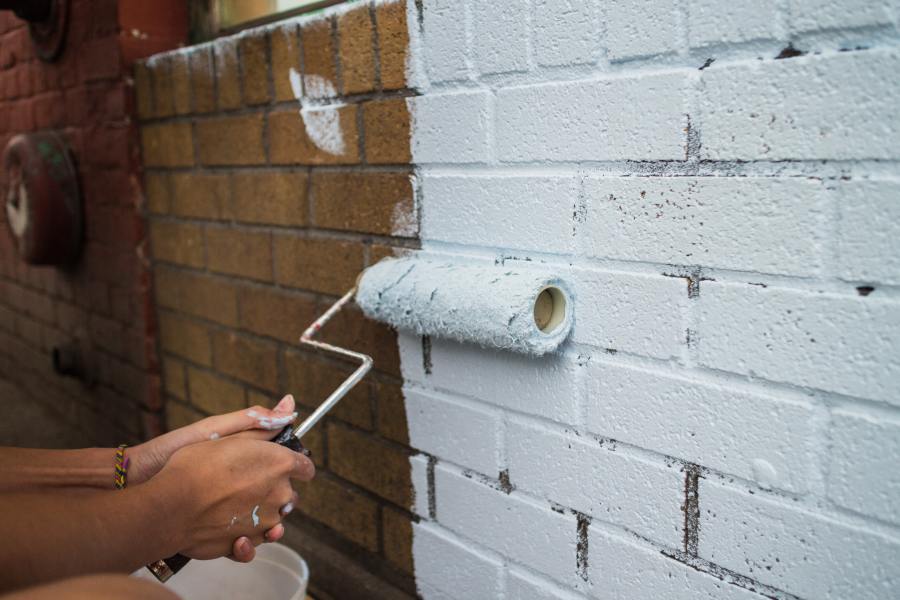
To speed up the process, you can use a roller, but the seams will have to be repainted with a brush
Important! Brickwork in an old house can only be painted after restoration and surface leveling.
Useful Tips
What you need to consider when choosing a brick wall in the kitchen:
- Natural brick looks great in the dining room area or on a non-working wall, but it is not suitable for an apron. For the cooking zone, it is better to choose ceramic tiles with the appropriate design.
- If you want one of the walls to be completely finished with bricks, you should choose the one that is best lit by the sun.
- It is not necessary to brick all walls of the kitchen, otherwise the room will not be any different from the basement. It is best to use this material as a link between zones or decor of openings.
- Brick kitchen should be as light as possible. For this, not only lamps and spots are used, additional illumination of furniture and countertops will also not be superfluous. To make the room more light, you can not close the windows with curtains that are too thick.
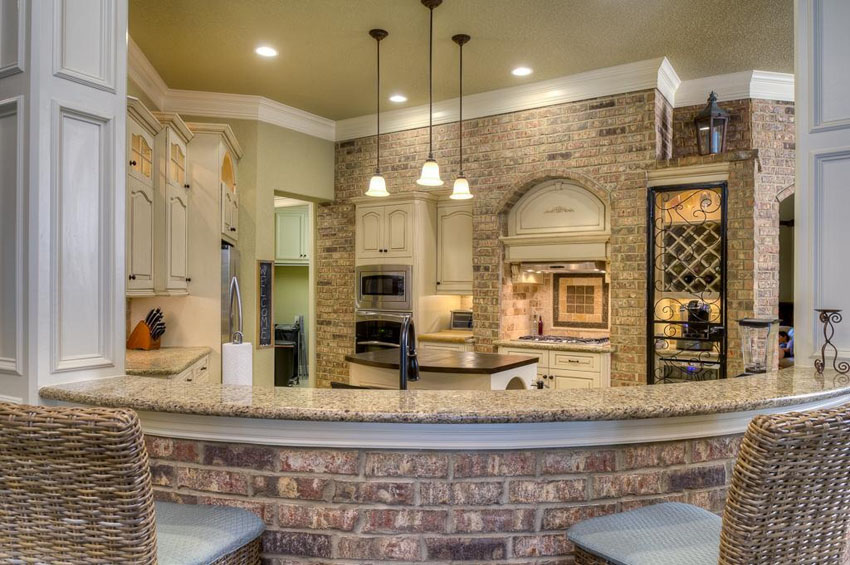
Lamps should fit seamlessly into the interior of the kitchen
- Facing tiles can decorate not only the surface of walls or floors, but also furniture. The brick is suitable for imitating a fireplace or creating a real home when it comes to a private house.
- The brick ceiling is an original solution, but is only suitable for private homes. In modern apartments, this decor not only looks too bulky, but can also be dangerous.
- If the walls of a house or apartment are made of brick, they do not have to be subjected to additional processing. But if you wish, you can paint part of the surfaces or highlight niches and ledges in a different color.
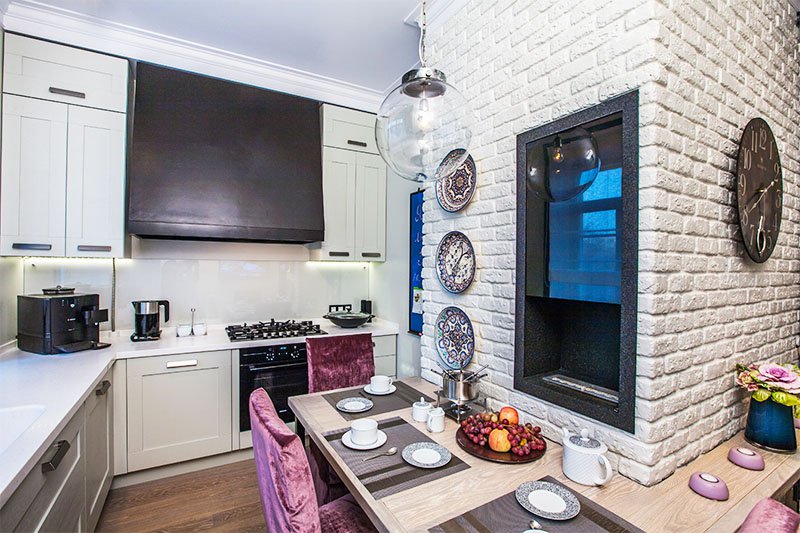
General design rule - for a small kitchen, it is better to use light colors, and dark ones are appropriate in spacious rooms with large windows
All of the above are not the only ways to use bricks in the kitchen interior. With proper imagination and taste, you can create a unique design.
Video: do-it-yourself brickwork imitation
